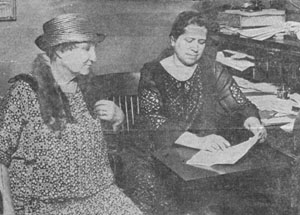
www.snohomishwomenslegacy.org |
|
|
ALICE U. KERR ~ MAYOR OF EDMONDS,
1925-27 By Charles Le Warne In December 1924, Edmonds narrowly elected Alice U. Kerr
as mayor, one of the first women to lead a
Washington city. |
 |
 |
She entered the race for mayor late in 1924 at the behest of
citizens decrying lax public behavior and poor law enforcement. "There has been
too much booze, too many pool hall disturbances and too slack an administration
of the law here for the public good, " Kerr told one audience. With Mayor Matt
C. Engels unopposed for reelection, she entered only two days before the final
vote and did not conduct a formal campaign. Single-page fliers announced that
“Mrs. Alice Kerr" was running at the request of "an earnest group of
representative citizens of Edmonds wishing a change of city administration." A
"sticker" candidate, she asked voters to write her name on the ballot.
On the first
count a single vote defined her victory over Mayor
Engels who gained two recounts before the City
Council awarded Kerr the victory by 163 to 159.
Despite stated concerns about lax law enforcement,
Kerr early on assured residents that rumors about
radical changes were unfounded. |
Then, the arrest of a pool room owner who had allowed a young boy to buy candy in the confectionary area of his business prompted controversy. City regulations did not allow minors in such establishments, but the owner denied he had to comply. Council members proposed to repeal the ordinances that governed the control and licensing of pool rooms.
In a “heated discussion” supporters argued that pool rooms were the only businesses paying city license fees that did not allow minors to enter their front rooms to purchase candy or ice cream, or to get haircuts. Nor was there evidence that pool halls contributed to crime. One council member suggested that the city should own and operate such establishments. The discussion extended to whether women should be allowed in pool rooms. The ordinance to repeal passed by a five to two vote, but Mayor Kerr’s opposition prompted applause from the audience.
The council overruled the veto by the same five to two margin though supporters claimed they might prepare a more satisfactory alternative. One member suggested other institutions posed a "greater menace to our young people than pool rooms."
Kerr’s moralistic stance was reflected when she proclaimed a nightly nine o’clock curfew for children. But she did not entirely blame the youth for unruliness. To a Baptist women’s conference she delivered a flaming address condemning “high-powered cars, guaranteed to make from sixty-five to ninety miles an hour” along with bootleggers and booze distillers who “give the youth their hell's brew. . . . Let's put the blame where it belongs, and confess that the example set by the grown-ups makes the honest parent pity the rising generation."
|
Mayor Kerr led an Edmonds delegation to visit Seattle officials. They conferred with Mayor Edwin J. Brown, a onetime Edmonds resident who that day announced he would run for the U. S. Senate. The party’s luncheon hostess was city council president Bertha Knight Landes, soon to be elected mayor of Seattle, the first woman to head a large American city. Mayor Kerr later addressed the council offering thanks and a welcome to Edmonds, "the sleeping porch of Seattle." Kerr's official functions were carried out with little regard for her gender, although newspapers often referred to her as Mrs. J. H. Kerr or Mrs. Kerr, even though official documents used the name of Alice U. Kerr. In March of 1925, ladies of the Baptist Church threw her a surprise birthday party with a decorated cake and an afternoon of quilting; a similar event would not likely have been reported had the mayor been male. When she left office, the Edmonds Coterie presented her with "a beautiful mirror," on behalf of the ladies of Edmonds. |
 |
Mayor Kerr declined to run for re-election, but she remained active in civic and church affairs, the Coterie, and the Edmonds Music and Arts Study Club. James H. Kerr, died on December 15, 1931. A decade later their 26-year-old grandson became the Edmonds’s first casualty of World War II. A naval officer, he was killed during early Japanese attacks on the Philippines.
Alice Kerr was 91 years old when she died early on Wednesday, August 10, 1949. Her three remaining children all lived in Edmonds, and she also left grandchildren, great grand children, and great great grandchildren. Services were held at the Edmonds Baptist Church, with her remains shipped to Ansley, Nebraska, to rest beside her husband.
Not until half a century after Kerr’s term as mayor did other women hold elective office in Edmonds. Several served on the council and two went on to the mayor's office: Laura Hall in 1992, succeeded four years later by Barb Fahey. Alice Kerr was not forgotten. Another successor, Mayor Gary Haakenson, took the lead in naming public rooms in the City Hall for notable predecessors; a second floor conference room honors Alice U. Kerr.
Edmonds City Council Minutes, 1924-27, microfiche in Edmonds City Hall.
The Edmonds-Triune Review, 1924-27.
Marie Botnen, "Early Edmonds . . . City Has Woman Mayor," Edmonds Tribune- Review, February 12, 1969.
“Mrs. Alice U. Kerr Former Mayor, Passes,” Edmonds Tribune-Review, August 11, 1949, p. 1.
A. U. K., "What It Costs to Develop a New Country: A Pioneer Experience," Lincoln [Nebraska] State Journal, January 2, 1927. Also typescript in Edmonds Museum. The article is written in the third-person but is clearly autobiographical.
Mrs. J. H. Kerr, "What It Costs to Develop a New Country, Article #2," typescript in Edmonds Museum.
“James H. Kerr Passes Away,” Edmonds Tribune-Review, December 18, 1931, p. 1.